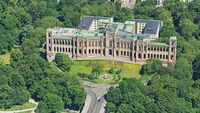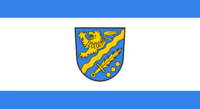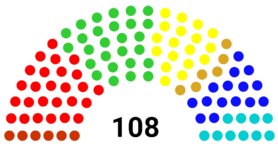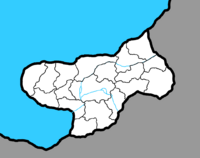Laitstadt
Laitstadt | |
|---|---|
Capital city, state and municipality | |
Clockwise, from top: Laitstadt skyline, Nortua Tower, Laitstadt World Center, Laitstadt Olympic Stadium, Federal Chamber, Martin Beiter Tower | |
| Nickname(s): L-Stadt, City of Freedom | |
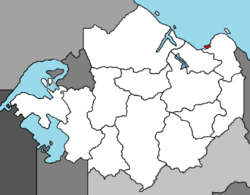 Location of Laitstadt in Besmenia | |
| Country | Besmenia |
| State | Laitstadt |
| District | Districts
|
| Government | |
| • Type | Parliamentary republic, partially sovereign member state of a federal state |
| • Body | State Chamber of Laitstadt |
| • Mayor and Governor | Tanja Balzer-Künert (GPB) |
| • Governing parties | GPB/SDU/PBL |
| • Federal Senate votes | 5 (of 64) |
| Area | |
| • Total | 503 sq mi (1,304 km2) |
| Population (2021) | |
| • Total | 5,550,627 |
| Website | laitstadt |
Laitstadt is the capital of Besmenia and with a population of 5,550,627 millions the largest city in the country. The city is one of the 14 federal states in Besmenia. Laitstadt borders the state of Metakumburg in the south and east. The city is one of the largest cities in Nortua. The Leina river runs through the city.
Laitstadt, which was founded in 1708, has been one of the most important centers in the Besmenian language area since the late 18th century. Laitstadt belonged to the Nortuan Union for a long time and was the capital of Heulania, an area which, in contrast to the rest of the Nortuan Union, had a very large majority of Besmenian speakers. Between February and July 1850, both sides fought in Laitstadt during the Besmenian-Tinegardian War, which destroyed about half of the city. In 1850 Laitstadt was incorporated into the Kingdom of Besmenia and remained the capital of Heulania until 1866. After the dissolution of Heulania as a result of the 1866 Besmenian territorial reform, Laitstadt became the capital of Metakumburg. In 1918, Metakumburg was one of the provinces that broke away from the Kingdom of Besmenia and formed the Confederation of East Besmenian States, along with Summingia, Gablitz, Neidenstein, Tergau and Sulzburg, with Laitstadt as the provisional seat of government. When the Federal Republic of Besmenia was founded after the Besmenian Civil War in 1920, Laitstadt became the official capital. As the federal capital, Laitstadt has developed into an important business location and metropolis of East Besmenia since the late 1920s. On July 16, 1923, Laitstadt was split off from Metakumburg and placed on an equal footing with the other federal states. Since 1967, Laitstadt has been the capital of the reunified Besmenia and thus for the first time the capital of an all-Besmenian state. In 1989, Laitstadt became the headquarters of the Alliance of Nortuan States.
Laitstadt is a world city of culture, media, science and politics. Many facilities such as the Bolumartin Hotel, the various universities, sports stadiums and museums have an international reputation. The city is also known for it's high quality of life. The city is a Nortuan transport hub of road, rail and air transport. Laitstadt is one of the up-and-coming, international centers for innovative company founders and start-up companies. The city records high annual growth rates in the number of people in work.
History
Before 1850
Kingdom of Besmenia
Captital of East Besmenia
Capital of the reunited Besmenia
With the accession of West Besmenia to the Federal Republic of Besmenia in September 1967, Laitstadt became the capital of the reunified Besmenia. Shortly after the reunification, a conflict of interest arose over the capital issue of the new reunited Besmenia. Many West Besmenians wanted Melmingen to be the capital of reunited Besmenia, as Melmingen was the capital prior to the division of Besmenia. As a result, a referendum was held in January 1968, in which voters could decide whether the seat of government should be moved to Melmingen or remain in Laitstadt. The majority voted to remain in Laitstadt.
Geography
Laitstadt is located in the southern part of the Bay of Laitstadt.
Climate
Laitstadt's climate combines features of continental and maritime climates. The annual average temperature in the city is 8.4 °C, the annual average precipitation is 651 mm. Most precipitation falls in August (77 mm monthly mean), the least in April (30 mm). The coldest month is February with an average temperature of −3.5 °C, while July is the warmest at 19.8 °C. In summer, maximum temperatures of up to 30 °C can be reached. In winter, temperatures below −7 °C are not uncommon.
Demographics
Politics and government
Almost all countries on Iearth have their Besmenian embassy seat in Laitstadt, while the 14 federal states are represented by state missions. A large number of diplomatic missions are located in the Mitte district.
Capital city
Laitstadt has been the official capital of the Besmenian Federal Republic since 1920. The city is the headquarters of the President, the Prime Minister, the Government, the Parliament and some federal ministries. Almost all countries on Iearth have their Besmenian embassy seat in Laitstadt, while the 14 federal states are represented by state missions. A large number of diplomatic missions are located in the Mitte district. As the seat of government for the state with the largest economy in Nortua, Laitstadt is one of the influential and sought-after centers of East Nortuan politics. Party headquarters, trade unions, foundations, associations and corporate lobby groups have their headquarters there so that they can exert their influence on decision-making processes in parliament and government. State visits and receptions at all political levels as well as state ceremonies and socially significant celebrations characterize Laitstadt's annual political calendar.
Federal State of Laitstadt
The city of Laitstadt has been a federal state since July 16, 1923. As an independent city-state within Besmenia, Laitstadt has the same rights and autonomy as the other federal states.
Legislature
The regional parliament of the state of Laitstadt, the legislative branch under the Constitution of Laitstadt , is the State Chamber of Laitstadt.
Executive
The Mayor and Governor and ten ministers form the city's state government. The Mayor and Governor is both the head of the federal state and the city. After the election to the State Chamber on June 5, 2022, a government consisting of GPB, SDU and PBL was formed under the leadership of Tanja Balzer-Künert (GPB) as mayor and governor.
Latest election
| Party | Votes | % | Seats | |
|---|---|---|---|---|
| Green Party of Besmenia | 938,287 | 23,4 | 27 | |
| Social Democratic Union | 910,218 | 22,7 | 26 | |
| Free Besmenian Citizen's Party | 641,564 | 16 | 18 | |
| Besmenian People's Party | 553,348 | 13,8 | 15 | |
| National Besmenian Party | 380,928 | 9,5 | 10 | |
| Party of the Besmenian Left | 228,557 | 5,7 | 6 | |
| Centre Alliance of Besmenia | 208,508 | 5,2 | 6 | |
| Other parties | 148,361 | 3,7 | 0 | |
| Total | 4,009,771 | 100 | 108 | |
| Registered voters | 4,892,119 | 81,96 | – | |
Boroughs
Laitstadt is divided into 18 districts.
Economy
The most important economic sectors in Laitstadt are the creative and cultural industries, tourism, biotechnology, medical technology, the pharmaceutical industry, media/information and communication technology, construction, retail, transport system technology, optics and energy technology. Around 77% of Laitstadt's total economic output is generated by the service sector.
Tourism
Laitstadt is among one of the most visited Besmenian holiday destinations by foreign tourists. Due to the positive development, the tourism industry in Laitstadt has become an important pillar of the regional economy. In addition to the hotel and catering industry, retail also benefits to a large extent from tourists
Infrastructure
Public transport
Laitstadt has a large network of public transport. It consists of the train lines belonging to the Besmenian Federal Railway (BBB), and the network of Laitstadt lines (S-Bahn, underground, tram and bus lines).
Sport
The most famous sports stadium is the Laitstadt Olympic Stadium. It was built for the 1976 Olympic Games, and later also hosted the 1986 World Cup. The Olympic Stadium is a venue for international football matches between Besmenia and other countries and also for music events.
Culture
Laitstadt is an internationally outstanding center of culture and enjoys the reputation of a Nortuan cosmopolitan city. As a production site for various branches of the creative economy, the metropolis is a magnet for many cultural workers.
Particular buildings
Opened in 1994, the Martin Beiter Tower, named after the Besmenian Prime Minister Martin Beiter, is one of the city's best-known sights and landmarks. With a length of 467.9 m (1,535 ft), the tower is the tallest building in Laitstadt and in all of Besmenia. The tower is today considered a Laitstadt icon.




